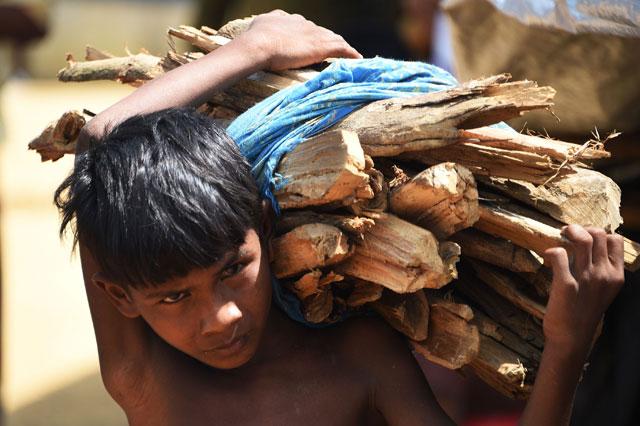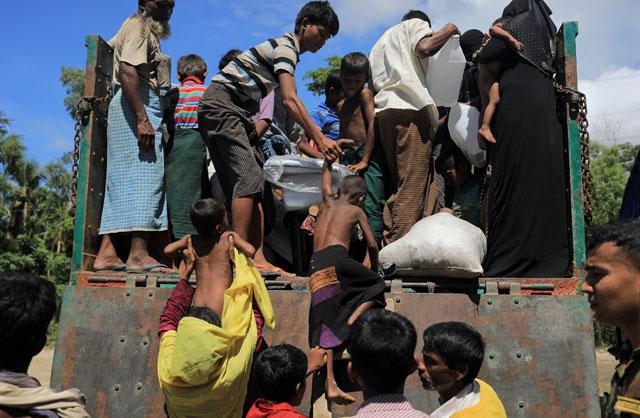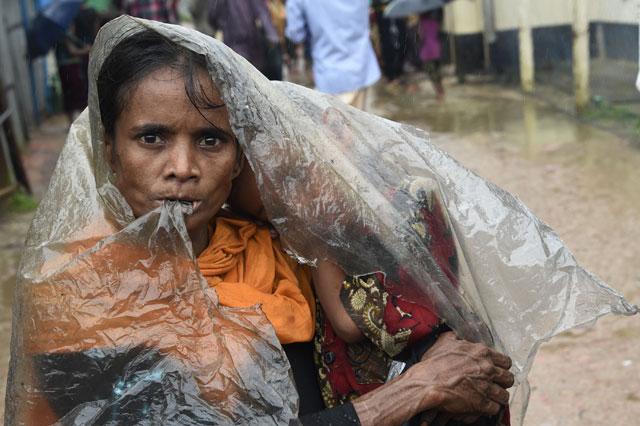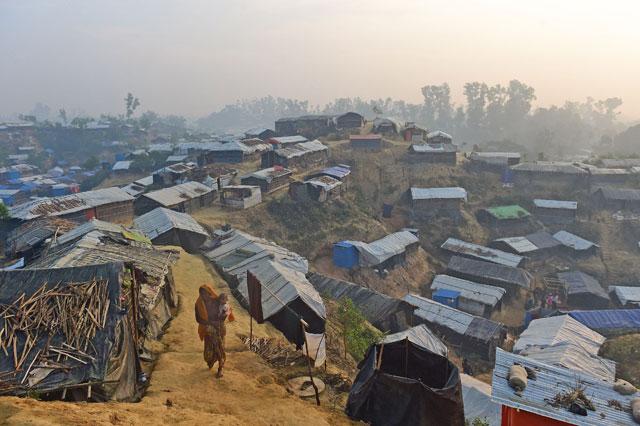You are here
Myanmar protesters try to block aid shipment to Muslim Rohingya
By Reuters - Sep 21,2017 - Last updated at Sep 21,2017

A young Rohingya refugee carries wood at the refugee camp of Balukhali, near the locality of Ukhia, on Thursday (AFP photo)
SITTWE, Myanmar — Buddhist protesters in Myanmar threw petrol bombs to try to block a shipment of aid to Muslims in Rakhine state, where the United Nations has accused the military of ethnic cleansing, before police fired in the air to disperse them.
The incident late on Wednesday reflected rising communal animosity, and came as US President Donald Trump called for a quick end to the violence that has raised concern about Myanmar's transition from military rule.
Myanmar's army chief, in his major speech on his plans for Rakhine State while on his first visit there since the strife erupted, called for internally displaced non-Muslims to go home.
But he made no mention of the 422,000 Muslims who fled to Bangladesh to escape his army's sweeping counter-insurgency operation.
Hundreds of protesters were involved in the attempt to stop Red Cross workers loading a boat with relief supplies bound for the north of the Rakhine State where insurgent attacks on August 25 sparked a sweeping military backlash.
The boat being was loaded with about 50 tonnes of aid at a dock in the state capital of Sittwe, a government information office said.
"People thought the aid was only for the Bengalis," the secretary of the state government, Tin Maung Swe, told Reuters, using a term that Rohingya find offensive.
Protesters, some carrying sticks and metal bars, threw petrol bombs and about 200 police eventually dispersed them by shooting into the air, a witness and the government information office said.
The witness said he saw some injured people. Eight people were detained, the office said. No aid workers were hurt, a spokeswoman for the International Committee of the Red Cross (ICRC) said.
"All emergency support done by the organisation and in the movement is done in a neutral and impartial manner," the spokeswoman, Maria Cecilia Goin, citing what the workers had told the crowd before authorities intervened.
Trump calls for swift action
Tension between majority Buddhists and Rohingya, most of whom are denied citizenship, has simmered for decades in Rakhine, but it has exploded in violence several times over the past few years, as old enmities surfaced with the end of decades of harsh military rule.
The latest bout of bloodshed began with the August attacks by Rohingya insurgents on about 30 police posts and an army camp, in which about 12 people were killed.
Myanmar's government says more than 400 people, most of them insurgents have been killed since then.
Rights monitors and fleeing Rohingya say the army and Buddhist vigilantes have mounted a campaign aimed at driving out the Muslim population and torching their villages.
Myanmar rejects the charge, saying its forces are tackling insurgents of the Arakan Rohingya Salvation Army who it has accused of setting the fires and attacking civilians.
The crisis has drawn international condemnation and raised questions about the commitment of government leader Aung San Suu Kyi to human rights, and about prospects for Myanmar's political and economic development.
Suu Kyi addressed the nation on Tuesday and condemned abuses and said all violators would be punished, adding that she was committed to peace and the rule of law.
However, she did not address the UN accusations of ethnic cleansing by the military, which is in charge of security.
Trump wants the UN Security Council to take "strong and swift action" to end the violence, US Vice President Mike Pence said on Wednesday, declaring the conflict a threat to the region and world.
Pence repeated a US call for the military to end the violence and support efforts for a long-term solution for the Rohingya.
US Deputy Assistant Secretary of State Patrick Murphy is in Myanmar and met government officials and representatives of different communities in Sittwe on Thursday.
'Go back'
Military Chief Senior General Min Aung Hlaing said the military had handled the situation as best as it could and he urged the internally displaced, most of who are Buddhist, to go home.
"For the national races who fled their homes, first of all they must go back... that is their rightful place," he said in a speech in the Sittwe.
"National races" refers to officially recognised indigenous ethnic groups who make up the diverse nation. The Rohingya are not recognised as a "national race" and Min Aung Hlaing did not refer to their return.
On Wednesday, he visited an army camp that was attacked on August 25 and said Myanmar was still suffering the consequences of "reckless" British colonialism.
Britain has suspended a training programme for Myanmar officers because of the violence. Myanmar said five officers were being brought home and none would be sent to Britain again.
The Bangladesh government and aid groups are struggling with shortages of food, water, shelter and medical supplies for the refugees, who keep coming, though at a slower pace than over the past couple of weeks, officials say.
Related Articles
YANGON — Myanmar's military has launched an internal probe into the conduct of soldiers during a counteroffensive that has sent more than ha
NAYPYITAW — Myanmar leader Aung San Suu Kyi on Tuesday condemned human rights violations in Rakhine state and said violators would be punish
DHAKA — Bangladesh and Myanmar have agreed to take help from the UN refugee agency to safely repatriate hundreds of thousands of Rohingya Mu














